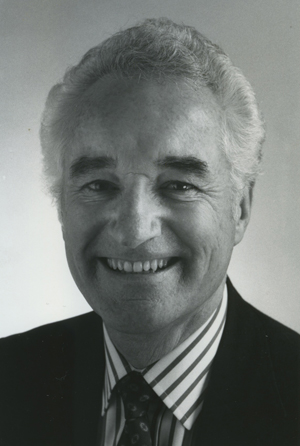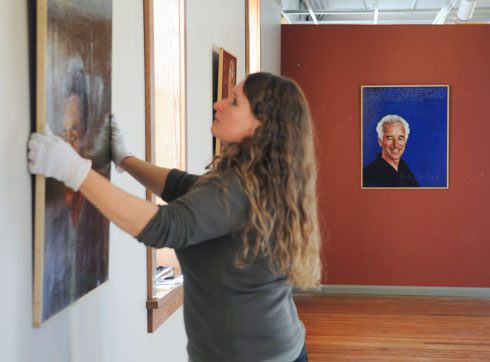Dowd Gallery Event Honors Bill Griffen ’50

02/28/2013
For more than half a century — throughout a career devoted to peace, the environment and social justice — the late William “Bill” Griffen ’50 brought purpose and life to SUNY Cortland’s campus.
One of the College’s most influential professors, the stories about his teachings tied to political awareness and activism likely will live on for eternity. And now, through a traveling art exhibition running currently at the Dowd Gallery, so too will the tale about Griffen’s place among America’s greatest champions of peace.
A recently-created, posthumous portrait of the SUNY Cortland professor emeritus of foundations and social advocacy hangs with the “Americans Who Tell the Truth” exhibit, a series of portraits by artist Robert Shetterly that focuses on people like Griffen who spoke out against injustice, often under difficult circumstances.
A special Dowd Gallery event on Thursday, March 7, celebrates the work and Griffen’s life.
Refreshments will be served at 7 p.m. and remarks will be made at 7:30 p.m. for the celebration. The event is free, however, the deadline to RSVP has passed. The gallery remains temporarily located on the third floor of Main Street SUNY Cortland, 9 Main St., in Cortland, and its current display runs through Saturday, March 9.
Gallery hours are 10 a.m. to 6 p.m. Tuesday through Friday and 10 a.m. to 2 p.m. Saturday, with it closed Sunday and Monday.
The portrait of an energetic and seemingly youthful Griffen is the newest among 22 portraits hanging in the upstairs gallery, among the likes of Muhammad Ali, Cesar Chavez, Shirley Chisholm and Alice Waters. The Beard Gallery located on Main Street SUNY Cortland’s first floor also includes six works themed around activist women in the arts.
Amy Griffen, the legendary professor’s daughter, has returned to the gallery on several occasions over the past month and a half, “just to be with him,” she said.
“The portrait’s so realistic, you feel like you’re looking at him,” Amy Griffen said. “And it doesn’t just capture him physically; it also captures his spirit.”
The story of Bill Griffen, educator and peace activist, is one that could be told for weeks without interruption while still leaving out key details and anecdotes. To most, he’s remembered as the energetic man who devoted a life to teaching, writing and activism, specifically as they relate to the causes such as civil rights, non-violent opposition to war and protecting the environment.
Notably, he remains the longest tenured faculty member in the 65-year history of the State University of New York and received SUNY’s Distinguished Citizen Award, which honors the highest standards of public service, in 2008, a year after his death from prostate cancer.
“Bill Griffen’s life’s work and legacy make him most deserving of this prestigious award,” said Carl Hayden, the former chairman of the SUNY Board of Trustees and a seventh-grade student of Griffen’s, at the time of the Distinguished Citizen Award presentation. “He was an extraordinary human being.
 |
|
Jaroslava Prihodova, the Dowd Gallery's manager, preps for the "Americans Who Tell the Truth" exhibition. The portrait of Bill Griffen ’50 can be seen in the background. |
“He stood for what is right and good and always acted upon it.”
Griffen stood tall in a career centered on education, earning a bachelor’s degree from SUNY Cortland in 1950 before serving in the U.S. Army during the Korean War and then returning to campus for a teaching certification. He taught junior high school in Marathon, N.Y., for two years and began his unprecedented teaching career at the College in 1955.
“He touched thousands of lives, making a positive impact that extends on, and will last indefinitely,” a former student once wrote. “Dr. Griffen was a marvelous representative of SUNY Cortland, a true humanitarian, an honorable and valuable role model whose memory deserves the utmost respect, and action, from us all.”
It was in the early 1960s that his political transformation occurred, after a former graduate student was murdered while wearing a sign and walking on a country road in Alabama as part of a one-person crusade to end racial segregation in the South.
That event launched Griffen into action and over the next several years he became involved with the Civil Rights Movement in Tennessee’s Fayette County, which at that time was among the poorest counties in the country. He and his wife, Judy, worked to register voters and promoted schools dedicated to literacy.
A doctorate degree from Cornell University followed for Griffen as did the bulk of a teaching career which spanned 10 U.S. presidencies. During that time, he calculated he taught more than 11,200 students, co-founding the Cortland Citizens for Peace and working with the Syracuse Peace Council.
And still, what remained more powerful than any statistic or line on a résumé was one of his life’s greatest messages: the key to social change is an educational system with vision to train critically thinking students about how to make living systems more just and sustainable, rather than a model that teaches students to assume roles in an unjust status quo
“If schools fail to help coming generations understand the humanistic and environmental dead end of this current cultural path, we have failed completely,” Griffen once said.
As a scholar, Griffen’s credits included more than 30 articles on social class, gender and racial inequalities to go along with two books, one of which included Teaching the Vietnam War, a critical examination of how history textbooks portray U.S. involvement in Vietnam.
His passion for the political process led to two unsuccessful runs at a Congress seat in 1968 and 1990 on an anti-war and social justice platform. However, his seemingly radical ideas at the time have since become more accepted.
And throughout his life, the man that many associate most closely with activism and teaching also found time and outlets for his others passions: family, baseball, jazz and photography, to name just a few.
The energy that seemingly allowed Bill Griffen to do it all made him one of SUNY Cortland's greatest educators as well as an unwavering champion of peace.
“We have been lulled over many generations to confuse ‘what is’ with ‘what ought to be’ or ‘what might be’ an alternative vision of existence,” Griffen once said. “Our systematic reality played out through generations of ‘since it is, it must be natural’ must be broken.”
For more than half a century — throughout a career devoted to peace, the environment and social justice — the late William “Bill” Griffen ’50 brought purpose and life to SUNY Cortland’s campus.

